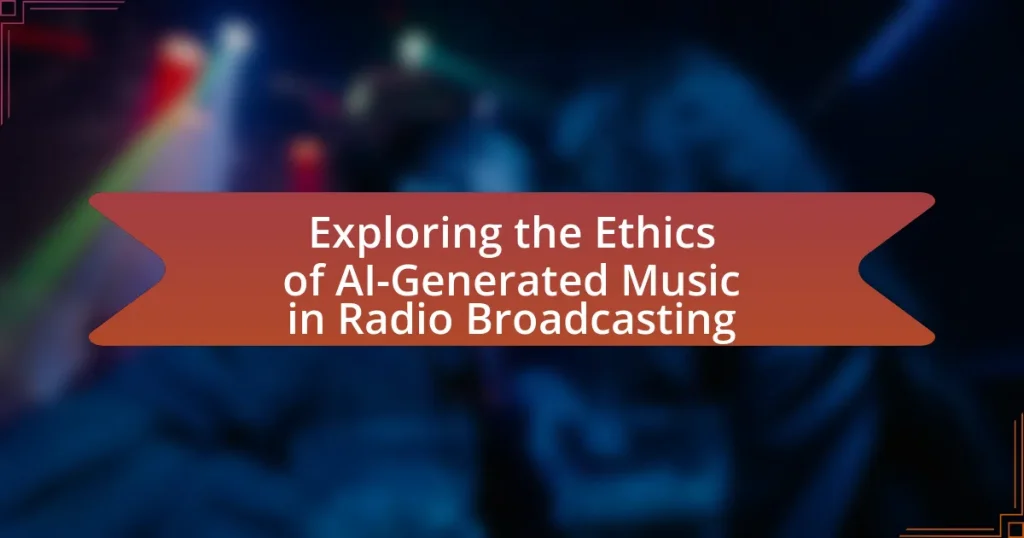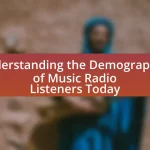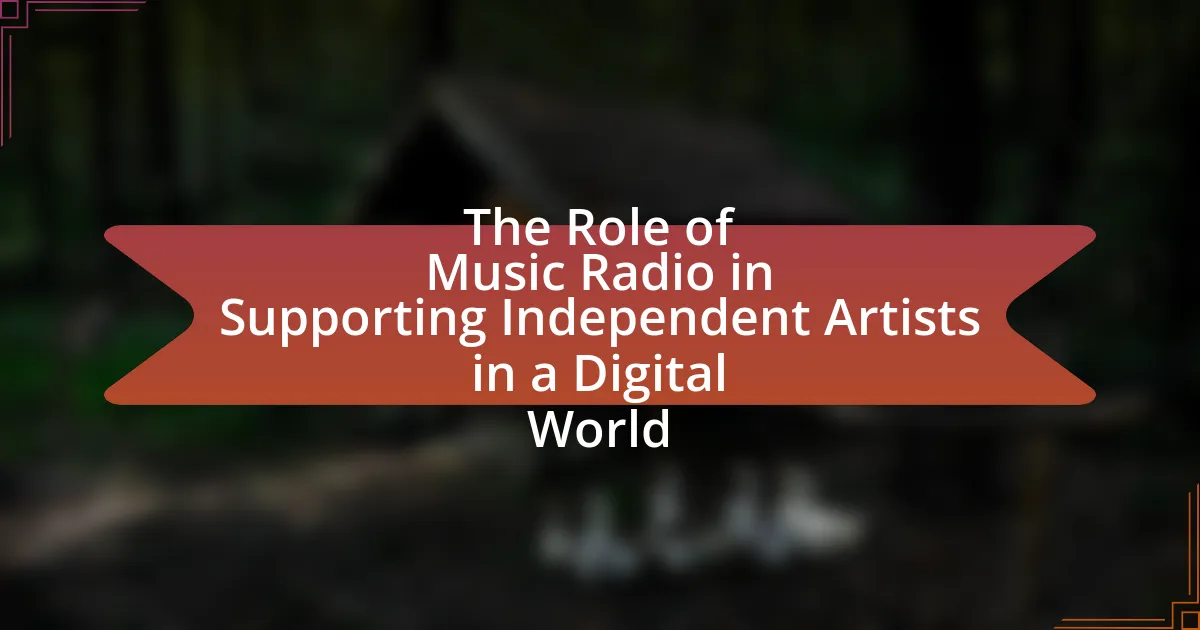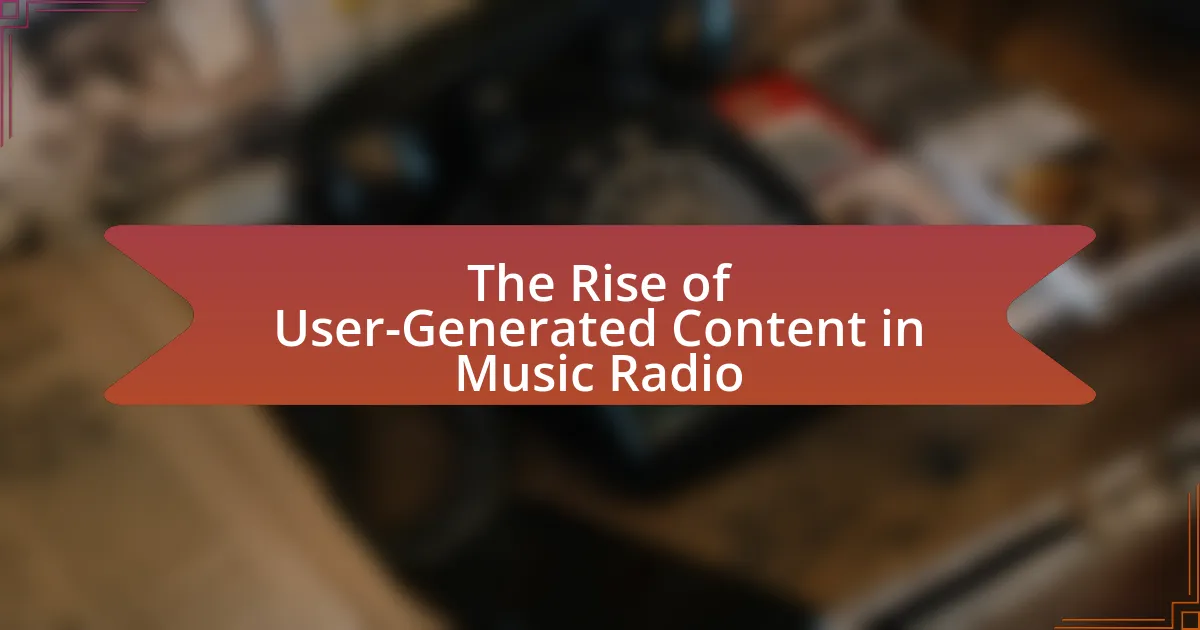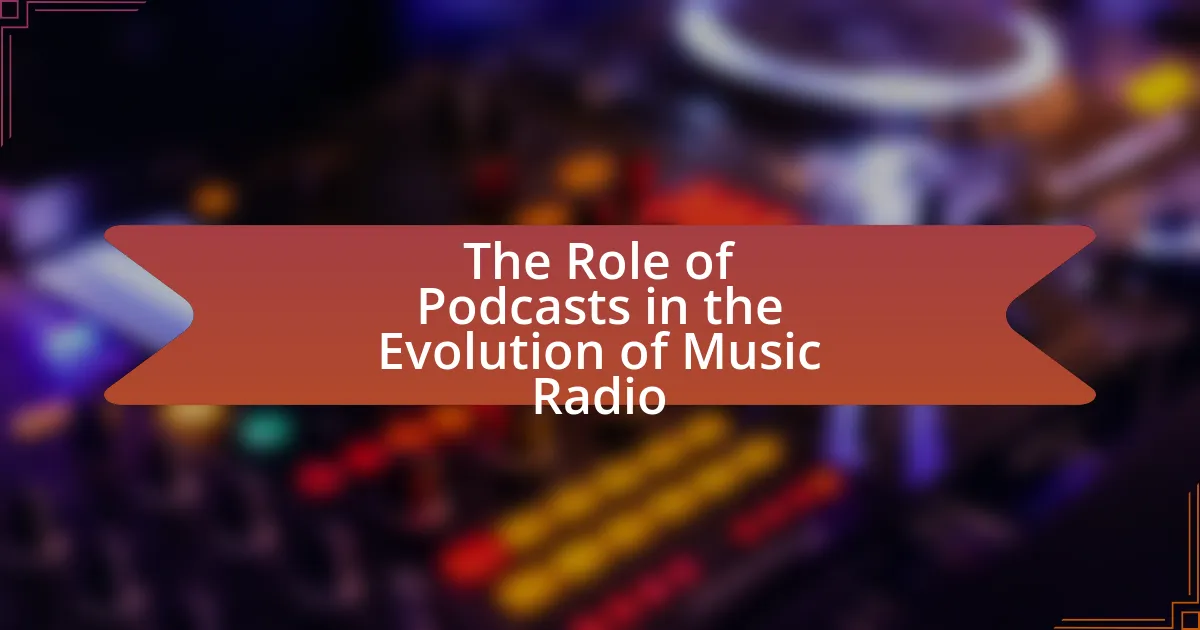The article examines the ethical implications of AI-generated music in radio broadcasting, focusing on issues such as copyright infringement, authenticity of artistic expression, and potential job displacement for human musicians. It highlights the differences between AI-generated and traditional music, emphasizing the unique characteristics of AI compositions and the complexities of their creation process. Additionally, the article discusses the legal considerations surrounding ownership and licensing of AI-generated music, the importance of ethical guidelines for integration into radio, and the potential benefits and challenges posed by this technology for artists and the music industry. Future trends and emerging ethical considerations are also explored, providing a comprehensive overview of the evolving landscape of AI in music broadcasting.
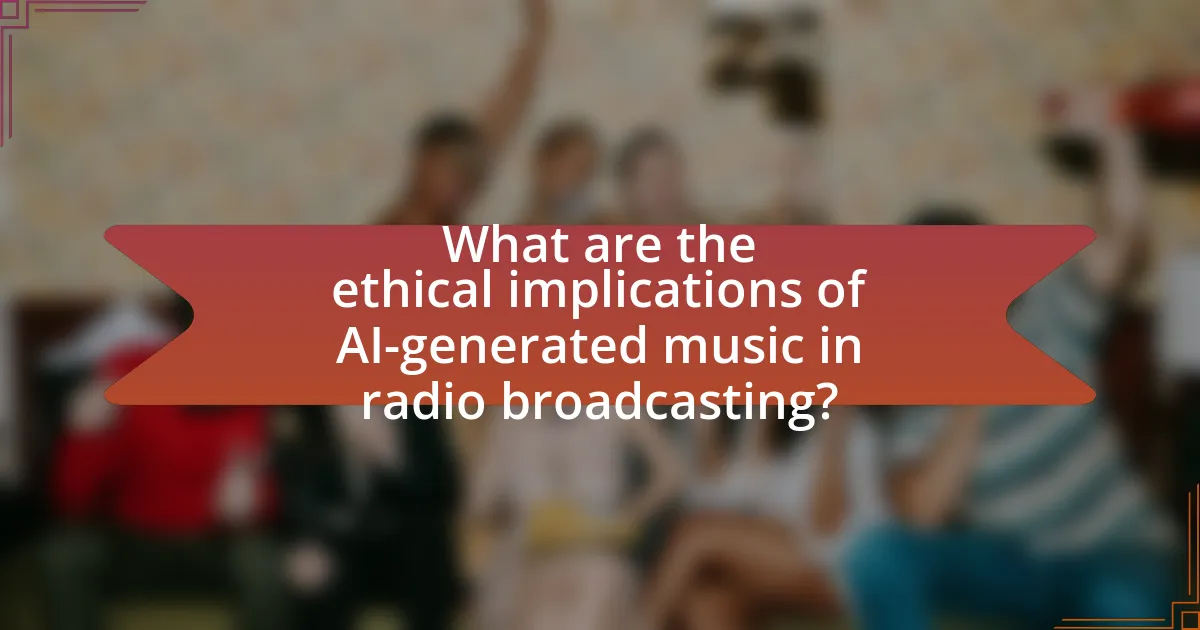
What are the ethical implications of AI-generated music in radio broadcasting?
The ethical implications of AI-generated music in radio broadcasting include concerns about copyright infringement, the authenticity of artistic expression, and the potential for job displacement among human musicians. Copyright issues arise when AI systems use existing music to generate new compositions, leading to questions about ownership and rights. The authenticity of music created by algorithms may undermine the emotional connection that listeners typically have with human artists, raising debates about the value of creativity. Additionally, as AI-generated music becomes more prevalent, there is a risk that human musicians may face reduced opportunities for employment, impacting the music industry economically. These implications highlight the need for clear ethical guidelines and regulations to navigate the integration of AI in music broadcasting.
How does AI-generated music differ from traditional music in radio?
AI-generated music differs from traditional music in radio primarily in its creation process and the role of human artists. AI-generated music is produced using algorithms and machine learning models that analyze existing music patterns, enabling rapid composition without human intervention. In contrast, traditional music involves human creativity, emotional expression, and cultural context, which are integral to songwriting and performance.
For instance, a study by the University of California, Berkeley, highlights that AI can generate music in various styles but lacks the nuanced emotional depth that human composers bring to their work. This distinction raises ethical considerations regarding authenticity and the value of human artistry in radio broadcasting.
What are the key characteristics of AI-generated music?
AI-generated music is characterized by its ability to produce compositions through algorithms and machine learning techniques. These compositions often exhibit unique patterns, styles, and structures that can mimic human creativity while also introducing novel elements. For instance, AI systems can analyze vast datasets of existing music to generate new pieces that reflect various genres, tempos, and harmonies. Additionally, AI-generated music can adapt in real-time to user preferences, creating personalized listening experiences. The technology behind AI music generation, such as neural networks, enables the creation of complex arrangements that may not be easily achievable by human composers alone.
How does the creation process of AI-generated music work?
The creation process of AI-generated music involves algorithms that analyze existing music data to learn patterns and structures. These algorithms, often based on machine learning techniques such as neural networks, are trained on large datasets of musical compositions, allowing them to understand elements like melody, harmony, rhythm, and style. Once trained, the AI can generate new compositions by predicting and synthesizing musical elements based on the learned patterns. For instance, OpenAI’s MuseNet can create music in various genres by leveraging its training on diverse musical datasets, demonstrating the capability of AI to produce coherent and stylistically relevant music.
Why is the ethics of AI-generated music important for radio broadcasting?
The ethics of AI-generated music is crucial for radio broadcasting because it addresses issues of copyright, originality, and the potential impact on human artists. Ethical considerations ensure that AI-generated content does not infringe on the intellectual property rights of existing musicians, which is vital for maintaining trust and fairness in the industry. For instance, the U.S. Copyright Office has stated that works created by AI may not qualify for copyright protection, raising questions about ownership and compensation for artists. Furthermore, ethical guidelines can help prevent the devaluation of human creativity, ensuring that radio broadcasting continues to support and promote original music while navigating the complexities introduced by AI technologies.
What ethical dilemmas arise from using AI-generated music?
The ethical dilemmas arising from using AI-generated music include issues of copyright infringement, the authenticity of artistic expression, and the potential for job displacement in the music industry. Copyright infringement occurs when AI systems generate music that closely resembles existing works, raising questions about ownership and intellectual property rights. The authenticity of artistic expression is challenged as AI lacks human emotions and experiences, leading to debates about the value of music created without human input. Additionally, the rise of AI-generated music may displace musicians and composers, creating economic concerns regarding employment opportunities in the creative sector. These dilemmas highlight the complex intersection of technology, creativity, and ethics in the evolving landscape of music production.
How do these dilemmas impact artists and creators?
The dilemmas surrounding AI-generated music significantly impact artists and creators by challenging their intellectual property rights and altering traditional revenue models. Artists face the risk of losing control over their work as AI systems can replicate styles and compositions, leading to potential copyright infringements. For instance, a study by the Electronic Frontier Foundation highlights that unauthorized use of an artist’s style by AI can dilute their brand and financial earnings. Additionally, the rise of AI-generated music in radio broadcasting can reduce opportunities for human musicians, as stations may opt for cheaper, AI-produced content over live performances, further threatening the livelihood of creators in the industry.
What are the potential benefits of using AI-generated music in radio?
AI-generated music in radio offers several potential benefits, including cost efficiency, customization, and increased content diversity. Cost efficiency arises from reduced production expenses, as AI can create music without the need for extensive human resources or studio time. Customization allows radio stations to tailor music to specific audiences or themes, enhancing listener engagement. Additionally, AI-generated music can introduce a wider variety of sounds and styles, enriching the overall programming and appealing to diverse listener preferences. These benefits can lead to improved listener satisfaction and potentially higher audience retention rates.
How can AI-generated music enhance listener experience?
AI-generated music can enhance listener experience by providing personalized soundscapes tailored to individual preferences. This customization is achieved through algorithms that analyze listener data, enabling the creation of unique compositions that resonate with specific moods or activities. For instance, a study by the University of California, Berkeley, found that personalized playlists significantly increase listener engagement and satisfaction, demonstrating that AI’s ability to curate music can lead to a more immersive and enjoyable auditory experience.
What cost-saving advantages does AI-generated music offer to radio stations?
AI-generated music offers significant cost-saving advantages to radio stations by reducing expenses related to music licensing and production. Traditional music licensing can be expensive, often requiring substantial fees for the rights to play popular songs. In contrast, AI-generated music can be created without the need for these licensing fees, as it is produced algorithmically and does not rely on copyrighted material. Additionally, the production costs are minimized since AI can generate high-quality music quickly and efficiently, eliminating the need for hiring musicians or producers. This efficiency allows radio stations to allocate their budgets more effectively, potentially increasing profitability while maintaining a diverse music selection.
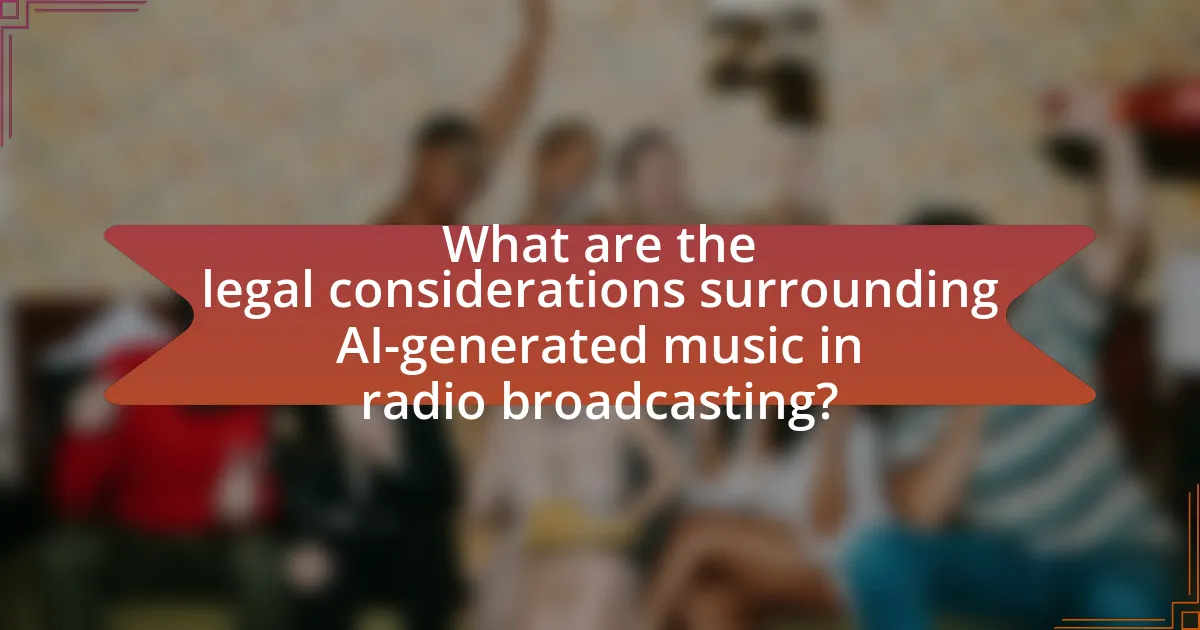
What are the legal considerations surrounding AI-generated music in radio broadcasting?
The legal considerations surrounding AI-generated music in radio broadcasting primarily involve copyright issues, licensing requirements, and the attribution of authorship. Copyright law protects original works of authorship, and since AI-generated music can be considered a derivative work, determining ownership can be complex. For instance, if an AI system is trained on existing copyrighted music, the resulting compositions may infringe on those copyrights unless proper licenses are obtained. Additionally, radio broadcasters must ensure that they have the appropriate licenses to play AI-generated music, which may involve negotiating with rights organizations or the creators of the AI software. Furthermore, the question of whether AI can be recognized as an author under current copyright laws remains unresolved, impacting how AI-generated music is treated legally.
How does copyright law apply to AI-generated music?
Copyright law applies to AI-generated music by determining the ownership and rights associated with the music created by artificial intelligence systems. In many jurisdictions, copyright protection requires a human author, which raises questions about whether AI-generated works can be copyrighted. For instance, the U.S. Copyright Office has stated that works created without human intervention do not qualify for copyright protection. This means that if an AI generates music autonomously, the resulting work may not be eligible for copyright, leaving it in the public domain. Additionally, if a human contributes to the creation process, such as by providing input or direction, that individual may hold the copyright, depending on the extent of their involvement. This legal framework is still evolving as technology advances and more cases arise, highlighting the need for clarity in copyright law regarding AI-generated content.
Who owns the rights to AI-generated music?
The rights to AI-generated music are typically owned by the entity that created the AI or the individual who programmed it, depending on the jurisdiction and specific agreements in place. In many cases, copyright law does not recognize AI as a legal author, which means that human creators or companies behind the AI retain ownership. For instance, the U.S. Copyright Office has stated that works created by non-human authors are not eligible for copyright protection, reinforcing that the rights belong to the human creators or their employers.
What challenges do radio stations face regarding licensing AI-generated music?
Radio stations face significant challenges regarding licensing AI-generated music, primarily due to the ambiguity in copyright laws. Current copyright frameworks do not clearly define the ownership of music created by artificial intelligence, leading to uncertainty about who holds the rights—whether it is the AI developer, the user, or the AI itself. This lack of clarity complicates the licensing process, as radio stations must navigate a legal landscape that is not fully equipped to address the nuances of AI-generated content. Furthermore, the rapid evolution of AI technology outpaces existing regulations, making it difficult for radio stations to ensure compliance and avoid potential legal disputes.
What role do regulations play in the use of AI-generated music?
Regulations play a crucial role in the use of AI-generated music by establishing legal frameworks that govern copyright, intellectual property rights, and ethical standards. These regulations ensure that creators of AI-generated music are recognized and compensated for their work, which is essential given the potential for AI to replicate existing musical styles and compositions. For instance, the U.S. Copyright Office has clarified that while AI can assist in music creation, the human element remains vital for copyright eligibility, emphasizing the need for clear guidelines on authorship and ownership. Additionally, regulations help address concerns about the ethical implications of using AI in music, such as the potential for bias in algorithmic composition and the impact on human musicians. By setting standards, regulations aim to balance innovation in AI music generation with the protection of artists’ rights and the integrity of the music industry.
How are current regulations adapting to the rise of AI in music?
Current regulations are adapting to the rise of AI in music by implementing frameworks that address copyright issues, transparency, and ethical considerations. For instance, the U.S. Copyright Office has begun to explore how existing copyright laws apply to AI-generated works, emphasizing the need for clarity on authorship and ownership. Additionally, the European Union’s Digital Services Act includes provisions that require platforms to disclose the use of AI in content creation, promoting transparency in how AI-generated music is presented to consumers. These regulatory adaptations aim to balance innovation in AI technology with the protection of artists’ rights and the integrity of the music industry.
What future regulations might impact AI-generated music in radio?
Future regulations that might impact AI-generated music in radio include copyright laws, licensing requirements, and transparency mandates. As AI technology evolves, lawmakers are increasingly focused on how to protect intellectual property rights associated with music created by algorithms. For instance, the U.S. Copyright Office has begun discussions on whether AI-generated works can be copyrighted, which could significantly affect how radio stations use such music. Additionally, regulations may require radio stations to disclose the use of AI-generated content to ensure transparency with listeners, aligning with ethical considerations in broadcasting. These potential regulations are driven by the need to balance innovation in music creation with the rights of human creators and the expectations of audiences.
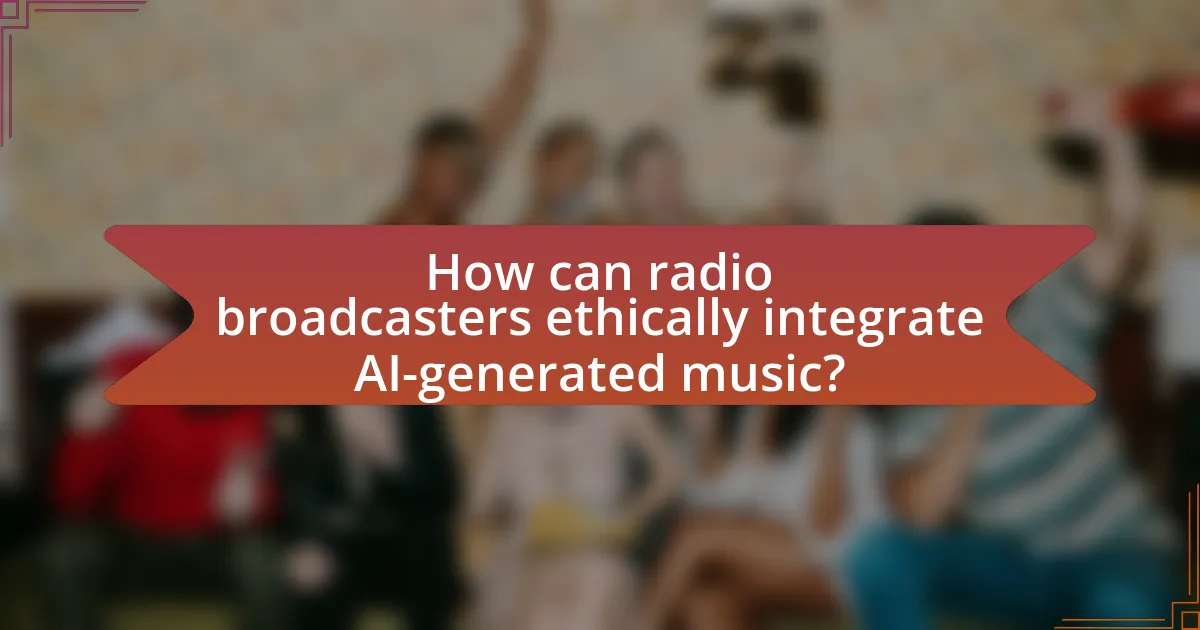
How can radio broadcasters ethically integrate AI-generated music?
Radio broadcasters can ethically integrate AI-generated music by ensuring transparency, obtaining proper licensing, and maintaining a balance between human and AI contributions. Transparency involves informing listeners when AI-generated music is played, fostering trust and understanding. Proper licensing is crucial, as it protects the rights of original creators and complies with copyright laws, ensuring that AI-generated works are legally used. Additionally, maintaining a balance between human and AI contributions preserves the artistic integrity of radio programming, as studies show that audiences often prefer a mix of both to enhance their listening experience.
What best practices should radio stations follow when using AI-generated music?
Radio stations should prioritize transparency and copyright compliance when using AI-generated music. Transparency involves informing listeners about the use of AI-generated content, which fosters trust and engagement. Copyright compliance is crucial, as AI-generated music can still be subject to intellectual property laws; stations must ensure they have the appropriate licenses or permissions to use such music. Additionally, radio stations should consider the ethical implications of AI music, such as the potential impact on human artists and the music industry. By adhering to these best practices, radio stations can responsibly integrate AI-generated music into their programming while maintaining ethical standards.
How can transparency be maintained with listeners regarding AI-generated content?
Transparency with listeners regarding AI-generated content can be maintained by clearly labeling and disclosing when content is created or influenced by artificial intelligence. This practice ensures that audiences are aware of the nature of the content they are consuming. For instance, radio stations can include announcements or visual indicators that specify when a piece of music or segment has been generated by AI, thereby fostering trust and understanding. Research indicates that transparency in media enhances audience engagement and satisfaction, as seen in studies by the Pew Research Center, which highlight that 73% of consumers prefer knowing the source of their content.
What measures can be taken to support human artists alongside AI-generated music?
To support human artists alongside AI-generated music, implementing fair compensation models is essential. These models can ensure that human creators receive royalties and financial benefits when their work is used in conjunction with AI-generated content. For instance, the Music Modernization Act in the United States has established frameworks for compensating songwriters and artists, which can be adapted to include provisions for AI usage. Additionally, promoting collaborative projects between human artists and AI can foster innovation while providing visibility and opportunities for human creators. Research indicates that collaboration can enhance creativity and lead to unique musical experiences, benefiting both parties involved.
What are the future trends in AI-generated music for radio broadcasting?
Future trends in AI-generated music for radio broadcasting include increased personalization, enhanced creativity, and improved integration with listener preferences. AI algorithms will analyze listener data to create tailored playlists, ensuring that music aligns with individual tastes and moods. Additionally, advancements in machine learning will enable AI to compose original tracks that blend various genres, pushing the boundaries of musical creativity. According to a report by the International Federation of the Phonographic Industry, the use of AI in music production is expected to grow significantly, with a projected increase in AI-generated content by 30% over the next five years. This trend will likely lead to a more dynamic and engaging listening experience for audiences, while also raising ethical considerations regarding copyright and the role of human musicians in the industry.
How might advancements in AI technology influence music creation?
Advancements in AI technology will significantly influence music creation by enabling automated composition, personalized music experiences, and enhanced collaboration between artists and machines. AI algorithms can analyze vast datasets of musical styles and structures, allowing them to generate original compositions that mimic human creativity. For instance, OpenAI’s MuseNet can create music in various genres by learning from thousands of songs, demonstrating AI’s capability to produce complex musical pieces. Additionally, AI can tailor music to individual listener preferences, enhancing user engagement and satisfaction. This shift towards AI-generated music raises ethical considerations regarding authorship, copyright, and the authenticity of artistic expression, which are crucial in the context of radio broadcasting.
What emerging ethical considerations should be monitored in the future?
Emerging ethical considerations in AI-generated music for radio broadcasting include copyright issues, transparency in AI usage, and the impact on human musicians. Copyright concerns arise as AI can create music that closely resembles existing works, potentially infringing on intellectual property rights. Transparency is crucial, as audiences should be informed when they are listening to AI-generated content versus human-created music. Additionally, the impact on human musicians is significant; as AI-generated music becomes more prevalent, it may reduce opportunities for human artists, leading to economic and cultural implications. These considerations are vital for ensuring a fair and equitable music industry as technology evolves.
What practical steps can radio stations take to navigate the ethics of AI-generated music?
Radio stations can navigate the ethics of AI-generated music by implementing clear guidelines for transparency and attribution. Establishing policies that require disclosure of AI-generated content to listeners ensures that audiences are aware of the origins of the music they hear. Additionally, radio stations should engage in regular discussions with stakeholders, including artists and legal experts, to address copyright concerns and ensure fair compensation for human creators. Research indicates that transparency in AI usage fosters trust and accountability, which is essential in maintaining ethical standards in broadcasting.
